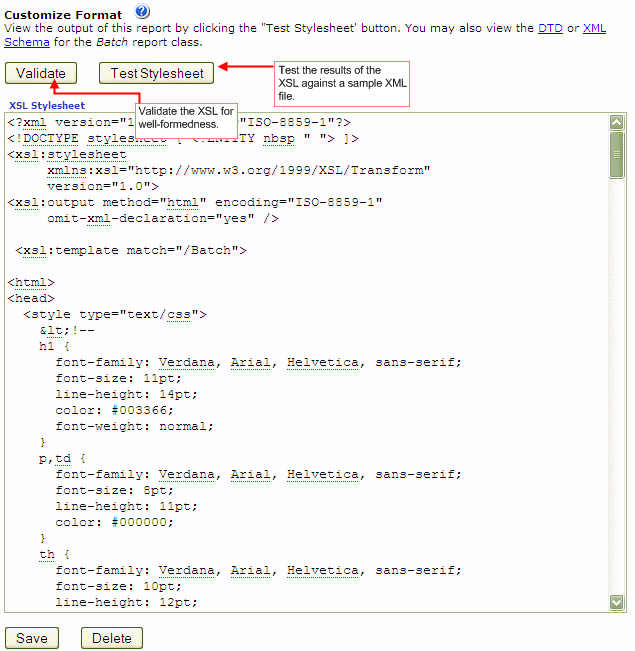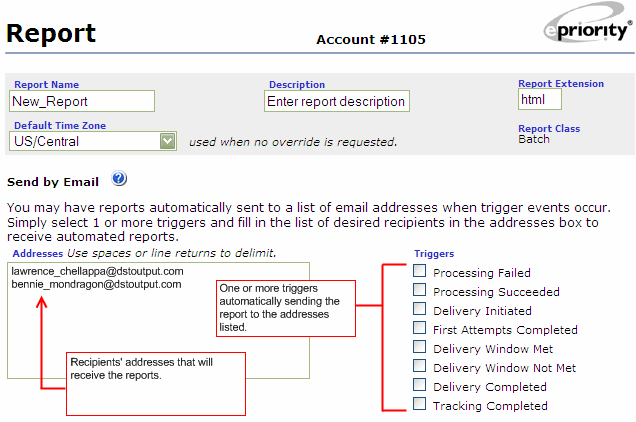| Custom Reports |
Using XSL stylesheets, you can customize batch and account
summary reports. Using report triggers, you can configure
automation for any report. The
reports are also available as ad-hoc web reports, and through
a Report Service application interface.
Reports can be formatted in any standard XSLT output format,
such as XML, HTML and plain text.
Settings
Report settings include the default timezone, automated triggers,
and address list. Unless overridden, the default timezone will be
used for all date fields in a report. The timezone may be specified
in a Report Service query or by a web user's
settings.
The triggers and address list are
required only when Automated Reports are
desired.
Ad-hoc Reports
After you have created a custom report, you may make an ad-hoc request for that report when viewing similar reports on the website. For example, if you have selected a Batch Summary report, you may choose to see any of your customized batch reports from the standard ePriority Batch Summary page.
Customizing using an XSL Stylesheet
Reports can be customized for different sets of source data, which
are defined as report classes. Each report class has a default
stylesheet provided. The source data for a report class is defined
in the DTD or XML schema for that report class.
Changes to an XSL stylesheet can be tested with any Javascript enabled
browser by clicking the "Test Stylesheet" button. Using the "Validate"
button, you can validate your stylesheet to pinpoint testing errors.
The validation is a well-formed XML check. It is a good idea to make
incremental changes, testing each change immediately to isolate errors,
because the Xalan-2 XSLT transformer returns very general error messages.
It is also recommended that you specify the 'method' attribute of the
XSL output element, which is used by the ePriority web server to specify the
Content-type when sending a report to a web browser or application.

Automated Reports
By selecting report triggers for a report, you can automatically receive reports when certain events occur. The occurrence of a trigger event will result in the custom report being created and mailed to all the addresses in the address list. We suggest using an HTML report format for email trigger lists and a plain text report format for pager address lists. Reports without an address list will be generated but not emailed. All generated reports can be found in the FTP /reports directory or on the Reporting-->View page of the website. As an example, you may want to receive a 'First Attempts Completed' report for all batches sent for your account. By selecting this trigger and adding your email address to the address_list for a particular report, you will receive an email of the report for any batch when all initial delivery attempts have been made.
| Report Data Types | |
| Batch Summary Data | Aggregate batch statistics. No specific information on email statuses. |
| Batch Email Data | Batch statistics including specific information on email statuses. |
| Account Summary Data | Aggregate statistics over time period. No specific information on email statuses. |
| Account Email Data (Daily Trigger enabled) |
Aggregate statistics over time period including specific information on email statuses. |
| Account Email Data ( Weekly/Monthly Trigger enabled) |
Aggregate statistics over time period including specific information on failed email statuses. |
| Account Mailgram Data | Aggregate statistics over time period for mailgrams (postal letters) delivered. |
| Relay Summary Data | Aggregate statistics over time period for transaction web service and/or SMTP relay emails. |
| Relay Email Data | Aggregate statistics over time period including specific information on email statuses. |
| Relay Email Failed Data | Aggregate statistics over time period including specific information on failed emails. |
Account Data and Account Email Data reports have cyclical time interval
triggers, but batch reports which are derived from Batch Summary
Data and Batch Email Data have different triggers based on batch delivery
status. One or more triggers can be chosen for each report.
All time period reports use Greenwich Mean Time for delineating between days.
| Batch report triggers | |
| Processing Failed | The entire e-mail batch failed |
| Processing Succeeded | The e-mail batch completed processing. All e-mails are recorded. |
| Delivery Initiated | First round of delivery started. |
| First Attempts Completed | First round of delivery attempts completed. |
| Delivery Window Met | First attempts completed before or on expected delivery due date. |
| Delivery Window Not Met | First attempts not completed before expected delivery due date. |
| Delivery Completed | All e-mails have been sent. Tracking continues. |
| Tracking Completed | All e-mails have been sent and all tracking has ended. |
| 1 | Status report 1 hour after batch processing was initiated by ePriority. |
| 2...9 | Status report X hours after batch processing was initiated by ePriority. |
| Account report triggers | |
| Daily Report | Receive a daily report about all e-mail processing for the account |
| Weekly Report | Receive a weekly report about all e-mail processing for the account |
| Monthly Report | Receive a monthly report about all e-mail processing for the account |
'Reports'-->'Mgmt'-->Creating a new batch report

'Reports'-->'Mgmt'-->Creating a new account report

Report Service
Client applications can request reports through an HTTPS query.
The authDate and authHash parameters are required for authentication of all Web API requests.
See authentication instructions.
The following information is required:
| Parameter Name | Description |
| authDate | current date for each request |
| authHash | Hexidecimal SHA256 string |
| account | account id |
| report | custom report name |
| bid/cbid | batch name or batch_id (for batch reports) |
Optional information includes:
| Parameter Name | Description |
| timezone | time zone (default is used if not specified) |
| start | start date (for account reports) |
| stop | stop date (for account reports) |
The time zone string may be any valid Java timezone ID. Specifying the time zone overrides the default time zone for a custom report. A full list is provided below.
The start and stop dates may be used for account summary reports. If no dates are given, the last full month of data will be used. The format (yyyy-mm-dd) must be used for dates.
The format of a batch query is: https://www.epriority.com/Reports?
authDate=2000-01-01:00-00-00&authHash=a19671a63d786d1314b28f2a58e3c4ee&
account=1234&report=XML_bounce_report&
bid=1234567&auth=FE654FAD&timezone=US/Eastern...
Line breaks and spaces would not be present in an actual query.
The format of an account query is: https://www.epriority.com/Reports?
authDate=2000-01-01:00-00-00&authHash=a19671a63d786d1314b28f2a58e3c4ee&
account=1234&report=statements_profile__report&
start=2003-12-01&stop=2003-12-17&auth=FE654FAD...
The format of a batch error message query is: https://www.epriority.com/Reports?
authDate=2000-01-01:00-00-00&authHash=a19671a63d786d1314b28f2a58e3c4ee&
version=1&bid=1234&view=error&timezone=US/Eastern...
Note that the Content-type returned to your application with be the same as the output method specified in the
Also, it is recommended that you URL-Encode your query string prior to submission.
Allowed Timezones
| US/Samoa | US/Hawaii | US/Alaska |
| US/Pacific | US/Mountain | US/Central |
| US/Eastern | America/Bogota | America/Guayaquil |
| America/Havana | America/Lima | America/Rio_Branco |
| America/Asuncion | America/Caracas | America/Guyana |
| America/La_Paz | America/Santiago | Atlantic/Stanley |
| America/Puerto_Rico | Brazil/West | Canada/Atlantic |
| Canada/Newfoundland | America/Buenos_Aires | Brazil/East |
| America/Scoresbysund | Atlantic/Azores | Atlantic/Cape_Verde |
| Greenwich | Portugal | Universal |
| Europe/Berlin | Africa/Johannesburg | Africa/Kigali |
| Asia/Tel_Aviv | Europe/Istanbul | Africa/Nairobi |
| Asia/Baghdad | Europe/Moscow | Asia/Tehran |
| Asia/Baku | Asia/Dubai | Asia/Yerevan |
| Asia/Ashkhabad | Asia/Karachi | Asia/Calcutta |
| Asia/Katmandu | Asia/Dhaka | Asia/Bangkok |
| Asia/Jakarta | Asia/Saigon | Asia/Hong_Kong |
| Asia/Manila | Asia/Shanghai | Asia/Singapore |
| Australia/West | Asia/Seoul | Asia/Tokyo |
| Australia/North | Australia/South | Australia/Brisbane |
| Australia/Sydney | Australia/Tasmania | Asia/Magadan |
| Pacific/Guadalcanal | Pacific/Auckland | Pacific/Fiji |
| Pacific/Kwajalein |